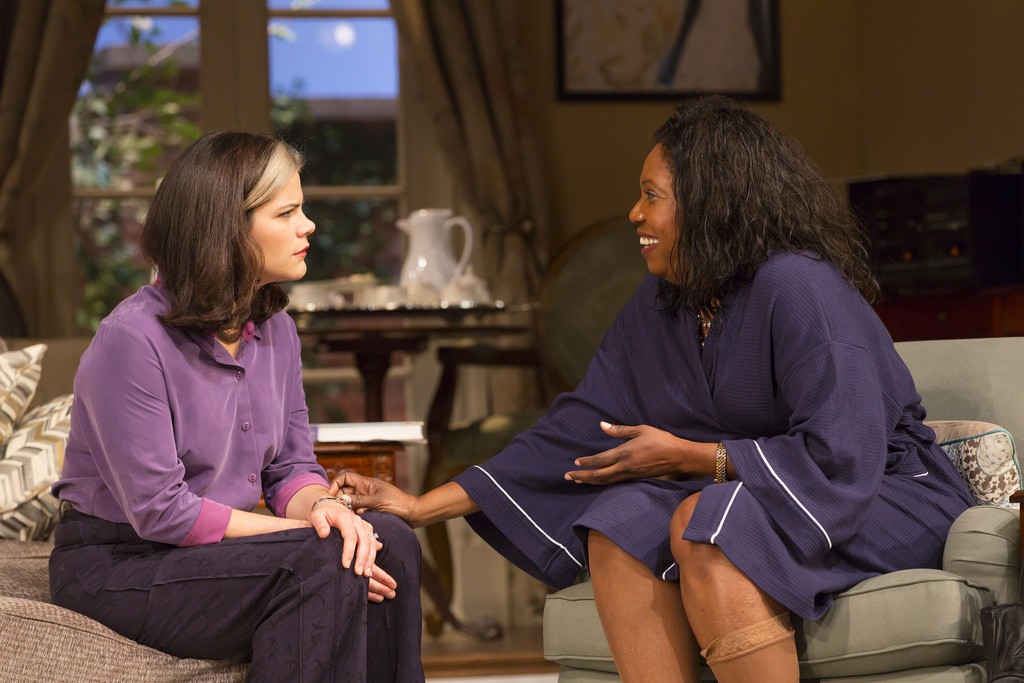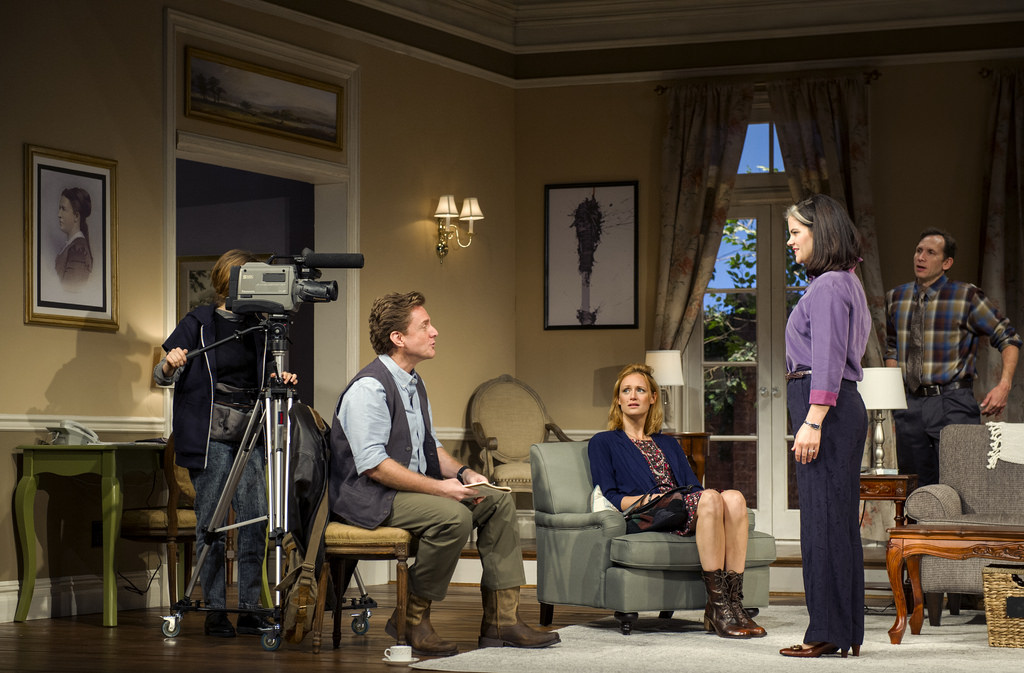The last line of Wendy Wasserstein’s An American Daughter is: “Tell them, ‘Our task is to rise and continue.’” Dr. Lyssa Hughes, the titular daughter, is telling her young son what he should do when people on the Internet criticize his mother, who has just withdrawn her name as nominee to become the Surgeon General of the United States after being caught in a media scandal over avoiding a juror summons.
The play premiered at New York City’s Lincoln Center Theater in 1997 (and was published in American Theatre in September of that year), when Internet trolling happened more in chat rooms than in comments sections or on Twitter. But the change of venue hasn’t changed the vitriol that’s still unleashed online in response to women in power. And walking out of the theatre at the Williamstown Theatre Festival, where the play ran Aug. 3-21, the question remained: Has our culture really “risen and continued” in how it views powerful women?
In an interview in the program, Williamstown artistic director Mandy Greenfield reflects on seeing the play at Lincoln Center. She says she could hear the late playwright speaking through her character’s words—that Wasserstein herself did not feel truly heard as a playwright in a field dominated by men (unfortunately, this is still the case with Wasserstein’s too-seldom-revived work). Greenfield says she wanted to program the play to “give Wendy’s fearless excavation of her characters’ experiences the attention it is due—especially this year.”
The play has obvious parallels to our nation’s current political season. Most obviously: The plot revolves around a successful woman nominated for a public office whose ability to do that job is called into question based on a dust-up from her past. Another resonance: There’s a line early in the play when Lyssa says one of the important issues she’d hope to address as Surgeon General would be to treat gun control as a healthcare issue. It’s both impressive that Wasserstein seems to have been writing with crystal-ball-like accuracy about our present, and uncomfortable that the gender politics of a play written and set in the ’90s feel so contemporary.
The play was mostly dismissed in this first production. In The New York Times, Ben Brantley critiqued it for being directionless and overstuffed with character details and plot points, writing, “Neither Dan Sullivan’s chipper, keep-it-moving direction nor Ms. Wasserstein’s justly famed ear for dialogue and bone-deep sense of craft can conceal the feeling that she doesn’t know entirely where she’s heading or how to get there.”
Sure, it’s not a perfect play. When Lyssa walks in on her husband Walter kissing his former student, now a young feminist talking head, it’s hard to resist an eye roll. But to dismiss the play as a whole based on some craft issues is to miss the work’s larger point: People are afraid of powerful women.
Sometimes those who claim to love the women in their lives are part of the problem. I’ve told this story in print before, but it bears repeating: When I asked my first serious boyfriend why he was breaking up with me, he responded, “I had never been with a woman as successful as you, and it was weird.”
In American Daughter, the husband is portrayed as being generally supportive and loving, but he can also be quite selfish. After Lyssa has embarrassed herself on television and has all but taken her name out of the running for the Surgeon General position, Walter says, “I feel like I’m disappearing, Lizard. I don’t know who I’m supposed to want to be anymore.” To which Lyssa heroically responds, “Walter, this is my nomination. Can we please not make it your humiliation?” Even when his wife’s life is going up in flames, he makes it all about him.

The play also reflects on the time that had passed since Wasserstein’s earlier works. Lyssa is a (figurative) relative of Wasserstein’s Heidi Holland, she of The Heidi Chronicles. While that play explores a young woman’s fight for equality from the 1960s to the ’80s, it definitely speaks forward to Wasserstein’s later work. In a scene set at a 1970 women’s Junior League meeting, Heidi says, “I hope our daughters never feel like us. I hope our daughters feel so fucking worthwhile,” as if to say, “I hope these fights were worth it.”
But in the late ’90s, Lyssa is still fighting the fight. And women today are continuing the battle for reproductive rights, advocating for sexual assault survivors, asking for equal pay, and still trying to get an Equal Rights Amendment back into the conversation.
But the battle isn’t just for the issues: It’s also within ourselves.
Lyssa’s namesake is Ulysses S. Grant; she’s his fifth-generation granddaughter. She displays a portrait of his wife Julia Dent Grant on her wall. I have a (very) distant political relative I don’t display as proudly: I’m sixth cousins with former Alaska Gov. Sarah Palin. I’ve never met Palin; I only know this because, in his retirement, my father has poured himself into charting our family’s ancestry.
Even how I found out speaks to how we negatively view women. I happened to sit in front of a celebrity (Billy Crystal) at a performance of Ivo van Hove’s revival of Arthur Miller’s The Crucible, and when I texted my parents to tout this sighting, my dad casually responded that I was a direct descendant of a woman who had died in a Salem jail after being convicted of being a witch. Oh, and Sarah Palin was also a direct descendant.
I was immediately appalled. Me and one of the most lampooned female politicians in recent memory are related? And we’re descendants of a women everyone thought was a witch? But then I stopped to consider that both women are largely defined by how others see them, not who they actually are.
Politics aside, and there are certainly elements of Palin’s politics I strongly disagree with, I don’t know her; I only know her through the media. And the Salem witch trials were famously a bunch of hooey: Men in power simply accused strong women of being witches to get rid of them. So why, 323 years later, do women still get labeled as that b-word that rhymes with witch? Why is a woman in a leadership role “bossy” in the boardroom while a man in the same position is strong and assertive? And why are we still talking about the struggle to “have it all”?
These are all questions that have come to the forefront of the conversation with our first female nominee from a major political party for president. From criticizing expensive jackets she’s worn at campaign speeches to harping on her vocal tone, Hillary Clinton has been taken to town for how she looks. There are plenty of reasons to disagree with either candidate on the issues, but do we really have to take them to task for their appearance and manner? These may seem like old fights, but a fresh viewing of Wasserstein’s nearly 20-year-old work proves how little has changed in terms of how we view women in public life. (Of course, all this is complicated by fact that Clinton’s husband was also president himself, but that’s another topic entirely.)
At the end of American Daughter, after Lyssa has withdrawn her name as a nominee, her friend Judith comes over. She too has reached the end of a quest—in her case, to have a baby, which she’s abandoning after several unsuccessful fertility treatments. Looking at both of their attempts to balance career and family, Lyssa concludes ruefully, “I don’t think this is what they meant by ‘having it all.'”
It would seem our task is still to rise and continue.


